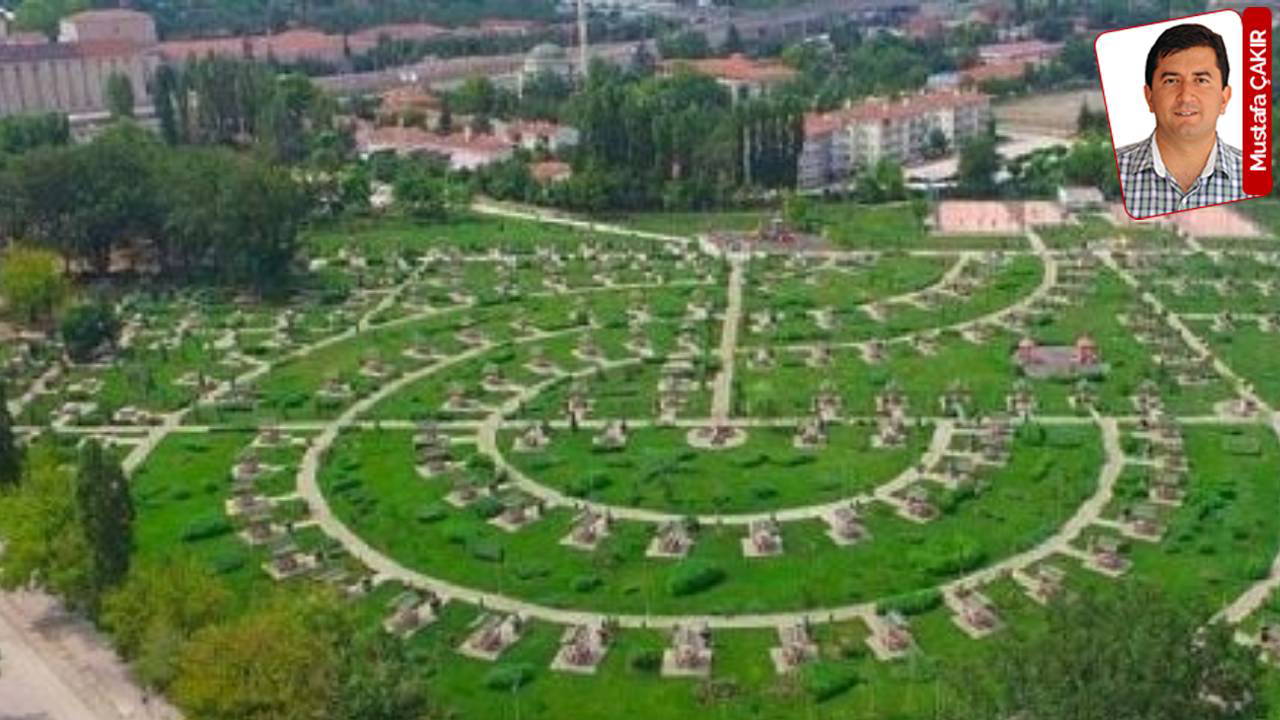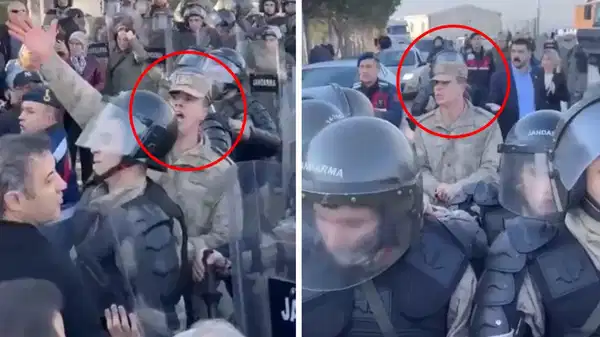Since he was wanted, Georgia deported Yılmaz twice to Turkey. He was not even arrested on either occasion. The current whereabouts of Yılmaz, on whose head there is a one million lira reward, are unknown. Syrian Afra Shaar, who was apprehended in Diyarbakır on 22 December and was placed on trial charged with being an Islamic State bomber, was released at the first hearing. Deniz Aktaş, who was reading the news on her mobile phone on a municipal bus in Istanbul was detained on a tip-off by an “informant citizen”.
Alican Uludağ / Seyhan Avşar
It has emerged from a “confidential” letter from the Ministry of Justice that Nusret Yılmaz, the Islamic State emir who was one of the defendants behind the Ankara Railway Station massacre in which 100 people died and was wanted under a red alert, passed without let or hindrance from Turkey to Georgia “by legal means.” The Georgian authorities, noticing that Nusret Yılmaz was wanted in Turkey as he passed through the Sarp border crossing, deported Yılmaz to Turkey. In the letter that the Ministry of Justice sent to Ankara and Gaziantep Chief Prosecutions, it is stated that Nusret Yılmaz attempted to cross the Sarp border crossing once again two days after having been deported but the Georgian authorities did not permit this. Question marks arise as to why Yılmaz, who had been unable to cross into Georgia and remained in Turkey, was not arrested.
Acting on a note by the Foreign Ministry, the Ministry of Justice sent a letter marked “confidential” on 1 February 2018 to Ankara and Gaziantep Chief Prosecutions and the Interior Ministry. The subject of the letter was Islamic State member Nusret Yılmaz, who was in the “green” category on the Interior Ministry’s list of wanted terrorists and had a one million lira reward on his head. It was noted in the letter sent by judge Mustafa Dündar, Bureau of Extradition and Transfer of Sentenced Persons Department Head, that Nusret Yılmaz was wanted internationally under a red alert with the control number A-9752/10-2017 based on apprehension orders issued by Ankara Serious Crime Court No 4 and Gaziantep Serious Crime Courts No 2 and 8 on the charge of “membership of an armed terrorist organisation.”
Apprehension record in place
In the ministry’s letter, referring to a letter received from Turkey’s Tbilisi Embassy, when Nusret Yılmaz wished to enter Georgia by legal means through the Sarp border crossing in the middle of 2017, the Georgian border police determined that the suspect had been declared wanted by both Turkey and the USA and, accordingly, Yılmaz was deported to Turkey under a joint decision by the Georgian ministries of Interior and Justice. However, the letter states that two days after this incident, Nusret Yılmaz once more turned up and tried to enter Georgia through the Sarp border crossing, but the defendant was nevertheless not admitted to Georgia by the Georgian authorities.
With it noted in the letter that a search into the aforenamed on the konsolosluk.net system revealed that an “H” restriction and a wanted notice by Interpol had been entered for “illegal organisational activity” on 10 July 2017, it was indicated that when access was attempted of the immigration/emigration record the warning “Police General Directorate Service Error; Error Arose in the Data Search Section” was obtained on multiple occasions.
The Justice Ministry’s letter ended with the following request of Ankara and Gaziantep Chief Prosecutions and the Interior Ministry, “Consequently, for information to be provided to us as to whether any procedures were conducted based on the said apprehension order following the deportation of the aforenamed, and, if so, the result of the procedure.”
QUESTIONS AWAITING ANSWER
This letter of the Interior Ministry shows that the absconded suspect Nusret Yılmaz passed through the Sarp border crossing with ease and was not arrested following his deportation from Georgia. This correspondence invites the following questions:
* How did an Islamic State member wanted under a red alert manage to pass by legal means through the Sarp border crossing?
* Why did the functionaries at the Sarp border crossing permit Nusret Yılmaz, who was subject to a restriction for “illegal organisational activity,” to cross?
* Why was Yılmaz, who was deported from Georgia, not arrested in Turkey? If he was, why was he released?
* Where is Nusret Yılmaz, who was denied permission to enter the second time by the Georgian authorities, now?
Islamic State bomber freed at the first hearing
Syrian English Teacher, Afra Shaar (28), who had been apprehended in Diyarbakır on 22 December last year and was placed in detention having spent six days in arrest and whose imprisonment for up to fifteen years was sought in a prosecution filed on the charge of “membership of an armed terrorist organisation” as an alleged bomber of the Islamic State terrorist organisation, was released on the grounds that the evidence had to a considerable extent been gathered, the time she had spent in detention and the absence of concrete facts suggestive of flight, concealment or tampering with the evidence. Shaar was released from prison on 18 January.
Counterterrorism Branch Directorate teams, acting on a tip-off in Diyarbakır on 22 December 2017, staged a raid on the home of the family of Islamic State terrorist organisation member Faysal Selimoğlu, who was allegedly in Syria. With the Syrian English teacher Afra Shaar, alleged to be an Islamic State suicide bomber, apprehended in the raid, a comprehensive search was conducted at the home. In the search, three mobile phones, 2 SIM cards, 2 tablets, a laptop computer, a document titled “Will” and a computer were seized.
Identified from among the seized digital materials were photographs presumed to have been taken by the arrested Afra Shaar and her husband through religious marriage Faysal Selimoğlu in conflict zones in Syria and in which they appear holding long-barrelled weapons.
Fifteen years imprisonment sought
An indictment, in which her imprisonment for up to fifteen years was sought on the charge of “membership of an armed terrorist organisation,” was drafted against Afra Shaar, who had been sent to prison having been detained by the court she was brought before following her statement.
Following acceptance of the indictment, the trial of the detained defendant Afra Shaar commenced at Diyarbakır Serious Crime Court No 8. Aleppo-born Shaar, appearing via video link at the first session of the trial held recently, said, “I am a Syrian citizen. At the same time, I have temporary leave to remain in Turkey. I am not a member of Islamic State. Faysal Selimoğlu is my husband. He died in Syria. My husband was an Islamic State member. I met my husband in Syria and we married there. We came to Diyarbakır two months after having married. We returned to Syria after having stayed for six or seven months. There were photographs on the mobile phone and those photographs were photographs of my husband.”
Released
The prosecutor, subsequently expressing his opinion, called on Shaar’s release to be ordered in view of the nature and character of the offence, the existing evidentiary situation, the absence of evidence to be gathered and the possibility of the nature of the offence changing in the defendant’s favour. The defendant’s lawyer Barış Yiğit, addressing the court next, called for Shaar’s release citing the absence of a single item of evidence that his client was an organisation member. Shaar was released from prison on 18 January. The hearing was adjourned. In her prosecution statement, Afra Shaar, stating that she was a graduate of the English teaching department of a university in Aleppo, had said, “I started working as a teacher in Aleppo. My working life ended with the start of the war in Syria. I married Faysal Selimoğlu alias “Abu Habiba”, with whom I became acquainted through a friend, in 2014 in Syria. My husband died while fighting in the ranks of the Islamic State terrorist organisation. My husband was a member of the Islamic State terrorist organisation. He carried out the organisation’s bomb and arms manufacture.”
Opposition members detained on the flimsiest of reasons... Informers not detention cause annoyance
Deniz Aktaş, who was travelling on a municipal bus in Istanbul, was detained the day before yesterday, having been arrested following a tip-off made by another passenger. Aktaş’s lawyer Gülhan Kaya said, “The detention measure is not a situation that will cause annoyance to her. If you are in the opposition in this country, this is a situation you frequently encounter. But, what is most annoying and troubling is this phenomenon of informing and reporting.”
Gülhan Kaya, lawyer of Deniz Aktaş who was sent to Bakırköy Prison having been detained as the result of a passenger’s tip-off, stated that the incident occurred at 6.30 am and said that this was not messaging as had been claimed but Aktaş was reading a report from a news site. The maker of the tip-off claimed that Aktaş was engaging in messaging at a group called Devrim-Der and had Abdullah Öcalan’s photograph on her phone. Kaya, stating that her client was a member of the Socialist Party of the Oppressed (ESP) and the Socialist Women’s Assemblies, commented, “That is, she is a politician. Now they cannot even tolerate looking at opposition news. Reading opposition news is a crime. Tip-offs of this kind have become widespread. People will now report those whose thoughts they do not like and who read opposition news and this will count as grounds for arrest, and is in fact doing so. It is this situation that scares us the most.”
The crime committed by the informant
Kaya, who asked the prosecutor to turn on and look at Aktaş’s phone, stressing that essentially what the informer passenger had done was a crime, said, “He/she is interfering in the personal life of the person opposite him/her. He/she perceives this to be the source of great pride. How sad that in this country such things are rewarded. The aim is to prevent people from expressing their opinions. Women are beaten in the middle of the street. People pass to the other side and watch. But, when things turn to politics and there is the slightest diverging opinion, this is met with detention for “organisation membership.” The most serious thing is the bringing of people into a state in which they cannot speak.”
The two faces of justice
Islamic State emir Nusret Yılmaz, who was one of the defendants behind the Ankara Railway Station massacre and was wanted under a red alert, twice passed by legal means from Turkey to Georgia.
21.02.2018 14:37:00
Güncellenme:















